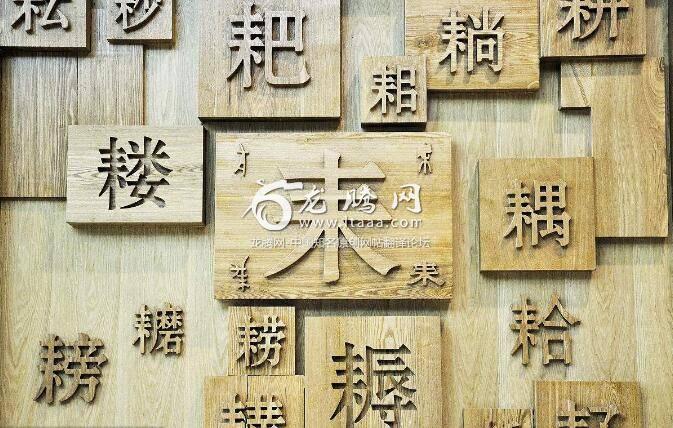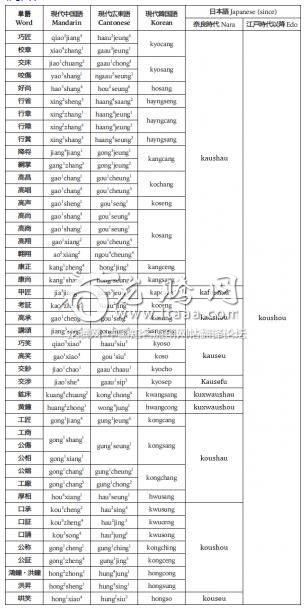汉字那么难学,日本人会什么还要用呢? [美国媒体]
quora网友:二战以后,盟军占领了日本,驻日盟军司令部也提过同样的问题。他们认为,日语夹杂着平假名、片假名和汉字,是一种混合的书写系统,实在是难以学会,学日语浪费了宝贵的时间,给学习其他科目造成了障碍。他们的解决方案就是:废除所有汉字,取消所有日语字符,用英语字母来表达日语......
Why do the Japanese still use the Kanji (Chinese characters) when it is so difficult to learn?
汉字那么难学,日本人会什么还要用呢?
Mayumi Suzuki (铃木 真由美), lives in Tokyo
Updated Nov 22
The GHQ of the Allied forces asked this exact same question when they were occupying Japan after WWII. They thought that the mixed writing system (combining hiragana, katakana and Chinese characters) was excessively difficult to learn, thereby creating a barrier to learning and taking up valuable time that could be better spent studying other subjects. The solutions they proposed included abolishing all Chinese characters (“kanji”), reducing the number of kanji in use, and abolishing Japanese characters altogether so that the Japanese language would be expressed using the English alphabet.
As a means of establishing that the current system was too difficult and needed to be changed, one of the officers in the GHQ requested that the Ministry of Education commissioned a “literacy survey” of the general population. This was carried out in August 1948 based on random sampling of equal numbers of men and women aged 15–64, using ration ledgers to ensure that people were chosen from all walks of life.
The final results for the 16,820 people who took the survey (more a reading comprehension test) showed that only 1.7% were completely illiterate (unable to answer a single question correctly) with 2.1% unable to write any kanji at all. The average score was 78.3, with slightly higher scores for those aged 20–24 (86.3) compared to the 15–19 age group (77.8), with the difference attributed to the toll of the war effort on education.
Apparently, these results so impressed the GHQ that all proposals to abolish kanji were subsequently dropped. Therefore, we can say that we owe the current writing system to the men and women who took the test back in 1948. However, perhaps it should be noted that the number of kanji in use has been reduced significantly since, and many of the kanji have themselves been simplified.
From a practical point of view, kanji are very useful.
First of all, they can save quite a bit of space, as a single kanji can express a word that might require 2 or 3 hiragana letters.
Second, they can avoid confusion, as there are so many homonyms in Japan.
One sentence that is often used to illustrate this goes:
きしゃのきしゃはきしゃしてきしゃしてきしゃできしゃした。
贵社の记者は骑射して喜捨して汽车で帰社した。
This sentence uses six ways of writing the word “kisha”(きしゃ)and, when rendered into kanji, means “Your newspaper’s reporter did some horseback archery, made a donation to the temple, and went back to his company by train.” Cool, isn’t it?
Third, in much the way that knowledge of latin and greek word roots can help English speakers to understand words that they don’t know, kanji and their radicals (parts of kanji) can help Japanese speakers to understand unfamiliar words.
For example, “otolaryngology” is 耳鼻咽喉科 in Japanese. The first character is “ear”, the second “nose”, and the third and fourth together mean “throat”. Although the kanji for “throat” is difficult, an 8-year old could look at this phrase and guess at its meaning since both of the kanji used for throat use the radical that means “mouth”.
*Fourth (initially left out but added after seeing some of the comments), since kanji was (and still is) used extensively throughout eastern Asia, knowing kanji means that you can make fairly decent guesses at the general meaning of signs, etc. that are written in kanji when you travel to places like Hong Kong, Taiwan, and Korea. Mainland China is a bit trickier, since they use ultra-simplified forms, but many people say that they can communicate with Chinese speakers to some extent by writing, if necessary. And, as Yumou Wei pointed out, it also means that people from countries that use kanji have an edge when traveling around Japan.
Is kanji a pain to learn? Yes.
Will we be giving it up in the future? Definitely not.
二战以后,盟军占领了日本,驻日盟军司令部也提过同样的问题。他们认为,日语夹杂着平假名、片假名和汉字,是一种混合的书写系统,实在是难以学会,学日语浪费了宝贵的时间,给学习其他科目造成了障碍。他们的解决方案就是:废除所有汉字,取消所有日语字符,用英语字母来表达日语。
盟军司令部的一名官员,为了证明现有的文字系统是难以学习的、是需要改变的,就要求教育部对普通人口进行一次“识字率调查”。这项调查开始于1948年8月份,是对年龄15-64岁的人们进行的随机抽样,男女各占一半,采用分类随机的方法,确保各行各业的人都有。
共有16820人参加了调查,主要是在阅读理解方面,结果显示:一道没回答正确的文盲,占1.7%;不会写汉字的,占2.1%;平均得分是78.3分,其中20-24岁年龄组的得分达到86.3分,15-19岁年龄组的得分只有77.8分,后一组识字率低的原因主要是战争的影响。
很显然,这些调查结果给盟军司令部留下了深刻的印象,随后那些关于废除汉字的建议都被取消了。我们可以说,我们当前的书写系统,要归功于那些参加1948年那场测试的人们。但是,也应该指出,自那以后,汉字在日语中的使用数量已经大大减少了,许多汉字也被简化了。
从实践的角度来看,汉字是非常有用的。
首先,汉字很省空间,一个汉字表达的意思,可能需要两三个平假名字母。
其次,汉字可以避免歧义,因为日语里有太多的同音词了。
我们经常用下面这句话来说明这一点:
きしゃのきしゃはきしゃしてきしゃしてきしゃできしゃした。
贵社の记者は骑射して喜捨して汽车で帰社した。
在这个句子中,“きしゃ”(kisha)用了六遍,表达的是六种意思;当用汉字表达的时候,意思就是“你们报社的记者,骑马射了箭,给寺庙捐了钱,然后坐火车回公司了”。很酷,对不对?
然后,在某种程度上,拉丁语和希腊语的词根,可以帮助说英语的人,猜出一些他们不认识的单词的意思;汉字和汉字的部首,能够帮助说日语的人,理解相似的词语。
例如,“otolaryngology”在日语中是“耳鼻咽喉科”。第一个字是“耳朵”,第二个字是“鼻子”,第三和第四个合起来是“咽喉”。虽然“咽喉”的汉字很难,但是一个八岁的孩子看到这个短语,也能猜测出它的意思,因为这两个汉字都用了“口”这个部首。
最后一点,一开始没想写的,但是看完评论后,我加了这点。在东亚地区,汉字是被广泛使用的,懂汉字意味着你可以很容易猜出标志牌的意思,例如你去香港、台湾、韩国旅游的时候,那些汉字标牌还是很容易看懂的,至于中国大陆,可能会难一些,因为他们使用的是超级简化的汉字,但是也有很多日本人表示,在必要的时候,他们用笔谈的方式可以跟中国人进行沟通。就像Yumou Wei提到的那样,使用汉字的人,他们来日本来旅游的时候,他们是有文字优势的。
学汉字痛苦吗?当然。
将来日语会放弃汉字吗?绝对不会。
He Jiang, lives in Changsha, Hunan, China (2012-present)
Answered May 21, 2017
Otherwise, there would be tons of homonyms in the Japanese language if the kana system were solely employed.
E.g. the sound of kōkū can represent words as 航空(aviation), 口腔(mouth/oral cavity), 高空(high altitude). Without the Chinese writing system i.e. Kanji, how can readers distinguish between these three?
By context? Oh, that’s gonna be great exercise LOL.
日语如果只使用假名的话,就会出现大量的同音词。
例如,koku的发音,可以表示航空、口腔、高空。不用汉字表示的话,你怎么分辨这三个词呢?
根据上下文?那您老也太有才了,哈哈哈
Lola Sugimoto (杉本 ローラ), lives in Shiga, Japan
Answered May 22, 2017
Because it makes written communication easier for Japanese people.
Sure, it’s difficult for foreigners to learn, and Japanese kids also need to make an effort. But as has been mentioned, Japanese has many homonyms, and kanji helps to distinguish meaning clearly and efficiently.
It’s also helpful for readers in that, even if you don’t know a specific, obscure word, you can guess its meaning very reasonably by looking at the kanji. That’s actually less confusing than English, in which you need to know etymology or other languages in order to make the same kind of guess.
因为用汉字,让日本人的书面交流变得更容易了。
当然啦,汉字对于外国人来说,还是很难学的。即使是日本的孩子,也要努力才能学会。就像上面提到的,日语里面有很多的同音词,汉字能够清楚有效地分辨它们。
即使不知道一个专业的、晦涩的词汇,日本人也可以通过看汉字,合理地猜出它的意思。这可比英语方便多了,不会让你遇到生词时那么困惑。在英语里,你必须了解其他外语和它的词源,才能做出同样的猜测。
Cornelius Goh, Native Chinese, fluent in English & French, learnt Japanese then Korean.
Answered Nov 6
This is an interesting anecdote regarding Kanji and Japanese phonetic homophones.
Once I was in Tokyo attending an IT Conference, an old Japanese sitting next to me politely asked me what the Japanese speaker ‘s slide title (in Katakana システムアーキテクチャー) meant. I was surprised because I was a foreigner who spoke no Japanese then. With my little knowledge of Japanese alphabet in Katakana, I managed to pronounce the sound accurately “System Architecture”, the old Japanese still couldn't understand because he knew no English. I then wrote in Chinese Hanzi : “系统 架构”. He finally understood the similar Kanji.
关于汉字和日语同音词,我这有个小故事。
有一次,我在东京参加一个IT会议。一个日本演讲者的幻灯片标题,是平假名写的“システムアーキテクチャー”(注:平假名中,外语名词都是音译),我旁边的一个日本老人礼貌地问我那是什么意思。我瞬间懵逼了,我是个外国人啊,我那时候还不会说日语呢!由于我也看不懂片假名,所以我用英语“System Architecture”说给他听,老头还是没懂,原来他也不懂英语。没法子,我只能用汉字“系统架构”写给他看,他终于懂了。
Yu Benjamin, former Freelance (Have Extensive Networks in Manufacture)
Answered May 24, 2017
I think it’s up to their choices. They can still communicate, read and write without Kanji; but they still use some of them because they are still on the way to make their own language system more perfect without Kanji, just like what Korea done. Korea old generation is able to write traditional Chinese characters because they were taught at school; on the contrary, young generation were not taught, in school, how to write Chinese characters any more. These countries chose to develop their languages because they want to get rid of the influences of Chinese culture.
我认为这是他们的选择。没有汉字的话,日本人也还是能够实现交流的,日语也能读、能写。他们之所以还会用汉字,是因为当前没有汉字的话,日语就会显得不完善,但是他们的目标是去掉汉字,就像韩国做的那样。韩国的老一代是能写繁体字的,因为他们在学校学过。但是韩国的年轻一代,他们在学校已经不再学写汉字了。这些国家之所以发展自己的语言,是因为他们想摆脱中国文化的影响。
Sara Nur
Answered Jun 5, 2017
Because, it’s way more easier for japanese to communicate each other even if it’s quite hard for foreigners. A sentence is written sooo long when you use katakana or hiragana. When you learn kanji, reading is so easy and funny. But writing? ehw…
汉字,对于外国人来说非常难,但对于我们日本人之间的交流来说,还是很容易的。当你用片假名和平假名的时候,一个句子要写的老长了。当你学汉字的时候,阅读就会变得既轻松又有趣,但是写的话,呃……
John Kang, knows Japanese
Answered Nov 22
Considering that the literacy rate in Japan is about 99%, Taiwan 99.7%, and China in the high 90%s, maybe Kanji aren’t as difficult to learn, after all.
English, with its complicated grammar and spelling exceptions, is probably hard to learn.
Of course, this also gets into the issue of public education…
日本的识字率99%,台湾的识字率99.7%,中国的识字率也高达90%以上,看看这些数字,也许汉字并不难学。
英语,除了复杂的语法和拼写,可能也很难学。当然,这又涉及到公共教育的问题了……
Meng-Ying Li, Reads and Speaks Japanese.
Answered May 26, 2017
An old joke says it all: Japanese people would agree to drop Chinese characters in their language if “こうないしゃせいたいかい” (校内写生大会/口内射精大会) pertains to no ambiguity.
Google/Bing translate the two sets of Chinese characters, you’ll see what I mean.
有个很老的笑话:当“校内写生大会”和“口内射精大会”,用日语发音不会产生歧义的时候,日本人就会放弃使用汉字了。
谷歌翻译一下那两句中文的意思,你就知道我在说什么了。
Lian Jie, native Wu Chinese speaker
Updated Nov 10
There are too many homophones and have not good solution.
Example:
因为日语同音词太多,而且没有好的解决办法。
例如:
Carl Shepherd, knows Japanese
Answered Feb 1
It’s efficient. I read somewhere that it takes on average 1/3 of the time for scan to scan a Japanese news-paper as it does for a language like English.
因为很高效啊。
我曾经看过这个消息,同样内容的新闻报纸,浏览下来,日语版只要英文版三分之一的时间。
Mhiko Yoshida
Answered May 23, 2017
Because our writing system, i.e. hiragana is not a very efficient way of stating what you’re trying to say. There are many meanings to one word and the chinese writing system helps with explaining what is exactly is. And if you’re wondering, we can exactly rely on katakana because it usually is used for english words, like facebook, フェスブック、instagram, インスタグラム. Hope it helped :)
因为我们书写系统的原因。比如,当用平假名来表达我们说的东西的话,效率不高。日语一个发音单词会有很多种意思,而汉字可以精确地表达我们想说的东西。你可能在想,我们可以用片假名啊,但是,日语中的片假名,一般是用来音译英语词汇的,例如: facebook, フェスブック、instagram, インスタグラム。希望能帮到你,嘻嘻。
Zhang Er
Answered Nov 22
I don’t think there is a why. Language evolve the way they do because of the people and the circumstances. If you are interested to learn or practice your Kanji, I would highly recommend apps like JLPT Locker to help you learn.
哪有什么原因啊,语言的进化依赖于人和环境的发展。如果你对汉字的学习和应用感兴趣的话,我强烈推荐你使用JLPT锁屏软件,它能帮助你的学习。
Hidezumi Inoue, knows Japanese
Answered Nov 1
Japanese language only have 50 syllables. Without Kanji (Chinese writing system) many words look same and it is not readable.
日语只有50个音节,没有汉字的话,许多词看起来都一样,没法下嘴啊
庆威 孟, studied at University of Sussex
Answered Nov 23
Why do the Chinese still use the Hanzi (Chinese characters) when it is even more difficult to learn?
Lol
只用汉字的话,岂不是更难,那中国人为什么还要用呢?哈哈哈
Haruku Mino, M.S. Computer Science, Southeast University (2016)
Answered Dec 1
Because I won a calligraphy competition and I’m not Chinese nor Japanese.
Because it’s beautiful and sharpens your brain.
我既不是中国人,也不是日本人,我用汉字,是因为我在书法比赛中得了奖。
汉字是很优美的,它能让你的大脑变得敏捷起来。
版权声明
我们致力于传递世界各地老百姓最真实、最直接、最详尽的对中国的看法
【版权与免责声明】如发现内容存在版权问题,烦请提供相关信息发邮件,
我们将及时沟通与处理。本站内容除非来源注明五毛网,否则均为网友转载,涉及言论、版权与本站无关。
本文仅代表作者观点,不代表本站立场。
本文来自网络,如有侵权及时联系本网站。
图文文章RECOMMEND
热门文章HOT NEWS
-
1
Why do most people who have a positive view of China have been to ...
- 2
- 3
- 4
- 5
- 6
- 7
- 8
- 9
- 10
推荐文章HOT NEWS
-
1
Why do most people who have a positive view of China have been to ...
- 2
- 3
- 4
- 5
- 6
- 7
- 8
- 9
- 10












